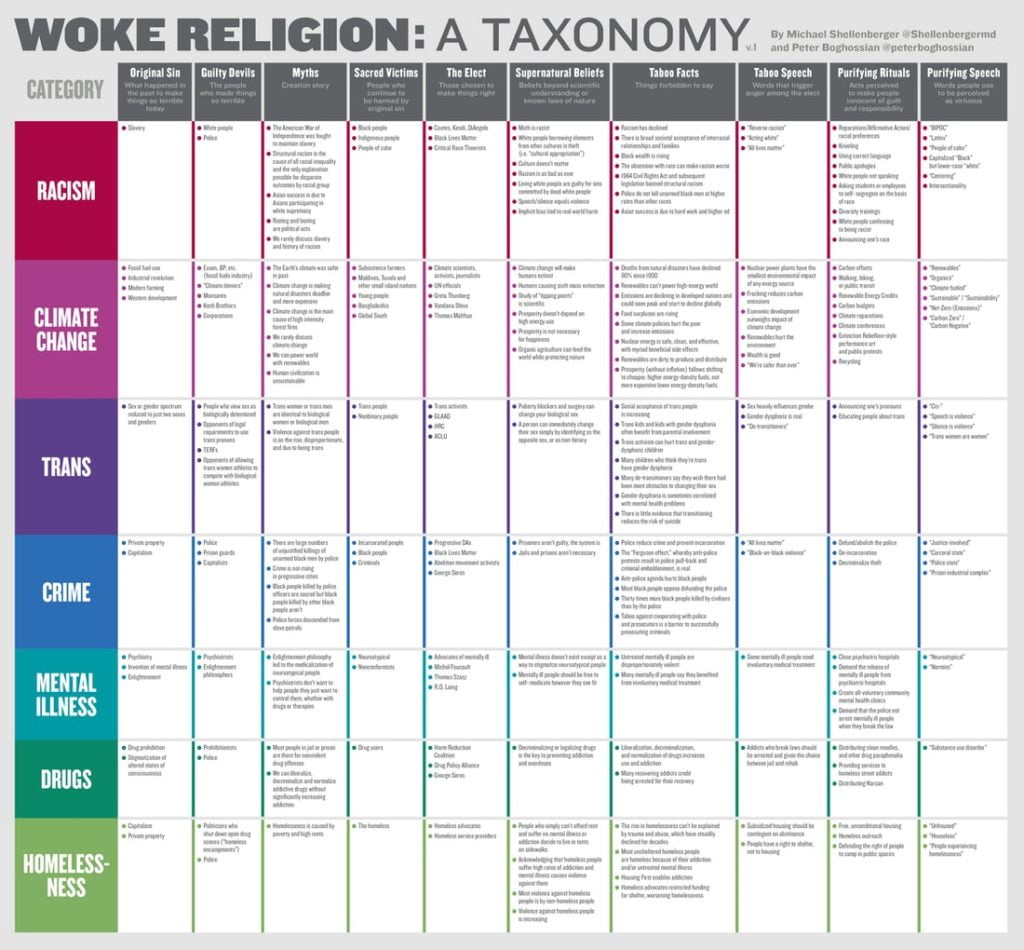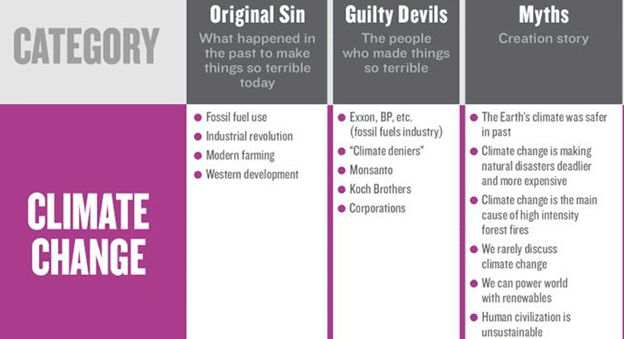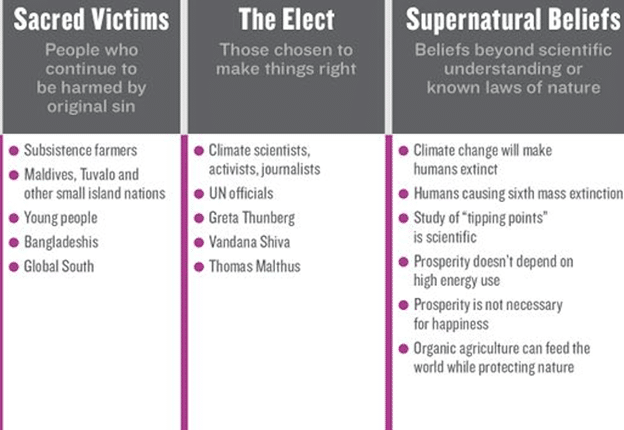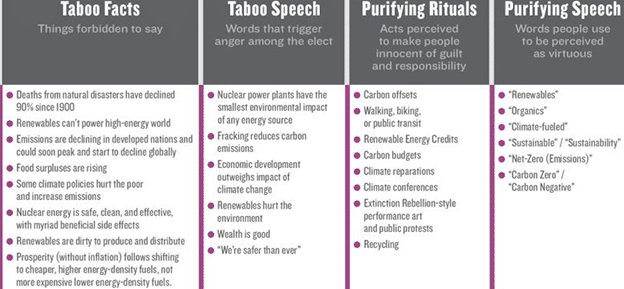Peter Boghossian and Michael Shellenberger recently released the following chart as part of the ongoing trend of arguing that “wokeness”, a term applied to an ever-expanding range of left of centre social justice movements, is a religion:

There’s a lot going on in this chart, enough for a whole series of articles on the way that different subjects are framed to fall under the umbrella debate about wokeness. For now, I’m going to focus on climate justice and what this chart might tell us about how anti-woke culture warriors are likely to engage with the ongoing debate over climate change. Here are those sections enlarged for readability:
For context, it’s worth comparing this to an earlier infographic by Gilley, Boghossian, and Lindsay, which was targeted at policymakers and shared widely within the anti-woke post-tribal community. In the earlier infographic, the main scare term is environmental justice, which is explained as turning environmental issues into race issues to use environmental issues for unrelated policy purposes. Yet, despite the new chart being a ‘wokeness religion’ taxonomy, the climate change section looks at first like your standard “Ecomodernist” talking points on climate and energy, devoid of any overt woke signifiers. As far as I can tell, the shift is likely due to the change in Boghossian’s collaborator, given that Shellenberger’s wrote Apocalypse Never: Why Environmental Alarmism Hurts Us All. There’s no mention here of climate justice or climate equity or any attempt to explain how wokeness in particular is behind these things.
As I was looking for hints of wokeness, the section on “The Elect” caught my eye. “The Elect” is a pejorative picked up from John McWhorter, who has been a leading advocate for calling wokeness a religion. Amongst “those chosen to make things right”, we have some gesturing at activists, journalists, and UN officials, along with three specific names: Greta Thunberg, Vandana Shiva, and Thomas Malthus. Odds are good everyone reading this knows Greta Thunberg, the young climate activist who did not seem to see UN officials as particularly elect. While I question calling Thunberg woke, it certainly seems that she is generally respected across much of the political left.
Vandana Shiva is likely less well known – she’s an Indian scholar and feminist environmental activist who has focused on biodiversity and resisting what she believes are harmful technologies, in particular GMO foods produced by companies like Monsanto. She has been widely criticised by scientists and skeptics for many of her claims about GMOs and for arguably conspiratorial allegations that the US is using food aid recipients as test subjects for GMO products.
The name that interested me most though was Thomas Malthus, author of the 1798 book An Essay on the Principle of Population, which noted that humans, like other animals, will tend to overpopulate in a way that might be harmful, and that because of our various capacities we’re particularly good at amassing resources to fuel that exponential growth. I remember learning about Malthus in high school science using the example of some very thirsty bunnies and an absence of predators. So, why is Malthus, an almost 200 years dead cleric, one of the woke’s chosen leaders when it comes to climate change?
The reason I found Malthus’ inclusion here interesting is that, prior to the rise of climate change concern on the left, Malthusian views were primarily associated with eugenics-sympathetic right-wing thinkers. Arguably the most famous modern Malthusian article is The Tragedy of the Commons by Garrett Hardin, which popularised the tragedy of the commons thought experiment as a way for discussing a range of collective action problems, including overpopulation. Hardin argued that there is no technological solution to the problem of overpopulation and that we must instead change our morals, because our morals compel us to create a welfare state and provide international food aid to poorer countries, which simply encourages further overpopulation. Harden was also an outspoken white supremacist who argued against multiculturalism and immigration, and expressed sympathies towards more coercive methods of controlling some populations as necessary to avoid societal collapse.
As a result of Hardin’s influence, the tragedy of the commons approach specifically to population control has been strongly associated with eugenics and racial stereotypes around “starving countries that are just too ignorant to feed and manage themselves”. As a result, what we might call woke environmental justice philosophy, led in this argument primarily by Elinor Ostrom, has largely been critical of the tragedy of the commons model, arguing that our problems are about wealth extraction through community disempowerment and exploitative capitalism, rather than the negligent behaviour of poor communities. Critics of Hardin have suggested alternative and less draconian approaches, involving returning control of commons to local communities. These approaches have in turn been criticised for their scalability.
There are some cases of Malthusianism amongst climate activists. David Attenborough is frequently cited for his claims that humans are a plague and that sending food aid to countries experiencing famine is “barmy”. Here, Attenborough was not just echoing Malthus, but Hardin’s Malthusianism in particular. Beyond that, you can certainly find some extreme environmentalist groups talking about humans as an invasive species in need of massive reductions. However, I haven’t seen anything to suggest this is a widely held position amongst “the woke”. At worst, many folks on the left and right probably hold some simplistic assumption that “of course these issues would be easier if there were fewer people”, without having any real commitment to that claim or any understanding of even the first level objections, and certainly no desire to see the idea applied through coercive methods or political policy.
Where things get more complicated is in discussions of family planning. Much has been made of the positive impact of giving increased reproductive control to women, though this approach has also been criticised for objectifying women as engines of social change. Conservative critics also argue that these approaches essentially reproduce classic eugenics outcomes under the guise of increased personal autonomy.
It is important that accusations of Malthusianism not get out of hand, because of their connections to the sorts of depopulation conspiracy theories now being pushed by anti-woke leaders like James Lindsay – the same guy who worked with Boghossian on the earlier woke infographic – which claim that globalists are out to substantially depopulate the world through engineered pandemics, or engineered vaccines, or some other engineered crises and fake solutions. The most dangerous version of this conspiracy is a form of antisemitic white genocide conspiracy, where the racial nature of climate justice is used to justify distributing the bulk of the depopulation amongst majority-white countries, with the whole endeavour really part of the ongoing secret war by Jews against whites, a topic that recently graced the pages of Philosophia. Notice that if you combine the environmental justice scare quote material from the first infographic, with the depopulation claims in the second, you get exactly this conspiracy theory. That’s the dangerous intersection that I worry we’re headed towards.
Statements by Bill Gates are frequently cited as proof of a globalist depopulation plan involving vaccines, illustrating the incoherence of placing all these ideas under the “woke banner”, given that the supposed “elect” Vandana Shiva has called for the dismantling of “Bill Gates’ empire”.
Given the existence of these racially charged depopulation conspiracies, it’s important that accusations of Malthusianism remain focused only on groups that advocate for coercive or immoral methods. It is wrong to blur these accusations so that they also apply to groups seeking to increase access to family planning. For some, this blurring serves as a means to continue their longstanding war on reproductive healthcare, but it comes at the cost of our ability to functionally discuss a holistic approach to addressing climate change in a just way. While there may be genuine ethical concerns about better and worse approaches to promoting family planning, claiming that these are just the newest versions of depopulation plans is alarmist.
Some days it feels like the pandemic has sidelined debates over climate change and other pressing issues. Assuming we can ever get back to addressing climate change, I expect to hear accusations of neo-Malthusianism bandied about. Hopefully they will be met with appropriate skepticism.






